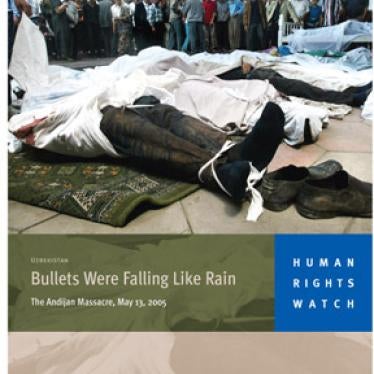(New York) - A regional security group of Central Asian countries along with Russia and China, the Shanghai Cooperation Organization should condemn the Andijan massacre committed by government forces of its member state Uzbekistan, Human Rights Watch said before the group meets on Tuesday in the Kazakh capital Astana.
Human Rights Watch has documented how Uzbek forces on May 13 massacred hundreds of unarmed demonstrators in the city of Andijan.
The Shanghai Cooperation Organization’s member states—Russia, China, Kazakhstan, Kyrgyzstan, and Tajikistan—should call on Uzbekistan to allow an independent, international investigation into the violence in Andijan, as has been urged by the United Nations, European Union, Organization for Security and Cooperation in Europe, the U.S. government and others. Representatives of member states will meet in Astana on Tuesday and Wednesday.
“The Shanghai Cooperation Organization should hold member-state Uzbekistan to account for the violence committed by government forces in Andijan,” said Holly Cartner, Europe and Central Asia director at Human Rights Watch. “If the Shanghai group ignores such a gross violation of fundamental rights, it undermines its own credibility in the region.”
The Shanghai Cooperation Organization, was founded in 1996 as the Shanghai Five to meet the need for regional security cooperation and confidence-building. The group adopted the name Shanghai Cooperation Organization in 2001 when it admitted Uzbekistan as its sixth member. The Shanghai group has pledged to forward the goals of political and economic cooperation in the region and collective security interests, including counterterrorism.
In an attempt to cover up the events of May 13, the government of Uzbekistan has put extensive pressure on fellow Shanghai group member Kyrgyzstan to forcibly return individuals who fled the massacre in Andijan and sought refuge across the border. The Uzbek government has conducted a relentless campaign to secure the return of these asylum seekers. Their return to Uzbekistan would be a violation of international law, as they are likely to be subjected to torture and even possible extrajudicial execution.
To date, the member states of the Shanghai Cooperation Organization have failed to condemn the massacre of hundreds of unarmed protestors in Andijan and they have failed to address the threat to regional stability posed by Uzbekistan’s pressure on Kyrgyzstan. During a June meeting of Chinese and Uzbek officials in Beijing the group’s secretary-general, Zhan Deguang, stressed that the Shanghai group does not interfere in the internal affairs of its member states. He expressed his confidence that the Uzbek government would be able to solve its internal problems.
“Uzbekistan is putting pressure on Kyrgyzstan to violate its international legal obligations,” said Cartner. “The Shanghai group should defend its member state Kyrgyzstan and assist it in upholding its obligation not to return anyone to a place where they will be tortured.”
Kyrgyzstan is a party to the Convention Against Torture, which forbids a state party to return a person to a country where he or she would face risk of torture. In violation of that agreement, and in an apparent effort to appease its neighbor Uzbekistan, Kyrgyzstan handed over four asylum seekers to Uzbek law enforcement agents on the night of June 9-10. The four men have since “disappeared” in custody and their fate is unknown.
U.N. Secretary-General Kofi Annan, the U.N. high commissioners for human rights and for refugees, and others have called on Kyrgyzstan not to carry out additional forcible returns of asylum seekers to Uzbekistan.






